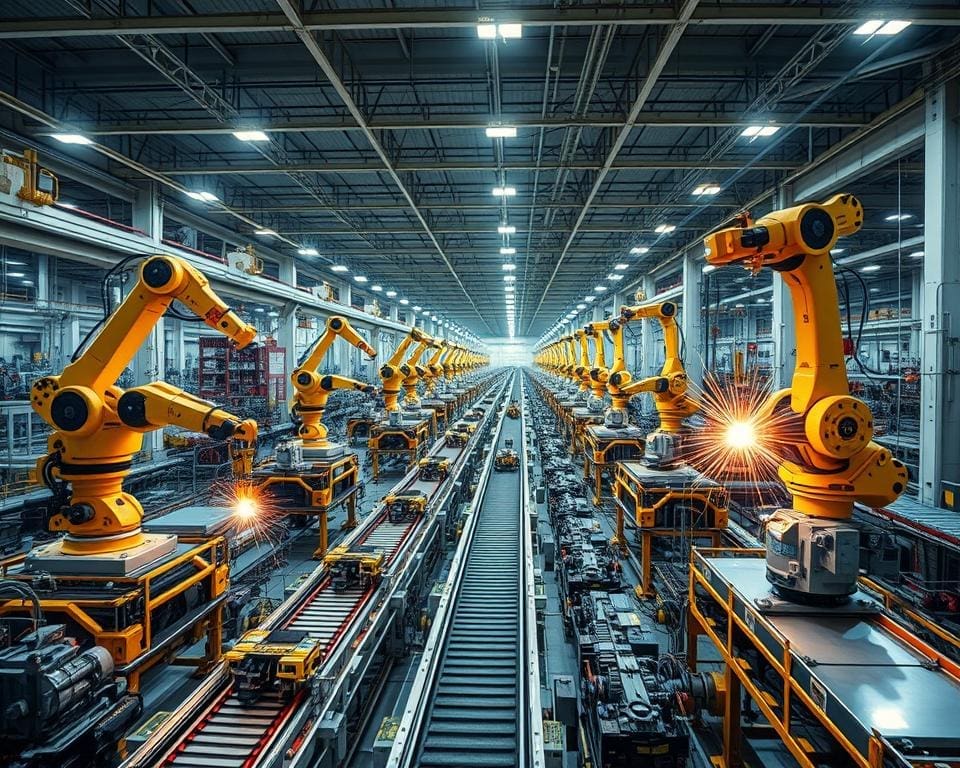In today’s fast-paced manufacturing landscape, the question of how automation can enhance factory efficiency is more pertinent than ever. With advancements in technology, factory automation has proven to be a transformative force, helping industries streamline operations and improve productivity. As companies adopt these innovative solutions, they not only optimise their processes but also increase manufacturing efficiency, thereby sustaining a competitive edge in their respective markets. Key statistics indicate a remarkable shift towards automation, illustrating the success stories of industry leaders who leverage these technologies to meet the ever-growing demand for quality and speed in production.
The Role of Automation in Modern Manufacturing
Modern manufacturing has undergone a dramatic transformation thanks to the rise of industrial automation. Ensuring success in this competitive landscape requires an understanding of the various technologies that drive efficiency and productivity. The integration of robotics in manufacturing plays a crucial role, with advanced systems now commonplace on production floors. Key players such as Siemens and ABB are at the forefront of these innovations, introducing solutions that revolutionise traditional manufacturing setups.
Understanding Automation Technologies
The heart of industrial automation lies in its technologies. Robotics in manufacturing encompasses robotic arms, cobots, and automated guided vehicles, each enhancing operational capabilities. These systems improve precision and speed, guaranteeing consistent output. In addition, artificial intelligence and IoT integration allow manufacturers to harness data for better decision-making. Predictive maintenance systems can foresee machine failures, preventing costly downtime and optimising resource usage.
Key Benefits of Using Automation in Factories
The benefits of automation extend far beyond mere efficiency. Factories that implement automation typically see improved safety for workers, as machines handle hazardous tasks, reducing workplace injuries. The precision of automated systems leads to a significant decrease in waste, aligning with sustainable manufacturing goals. Numerous studies affirm that businesses embracing industrial automation experience an average productivity increase exceeding 20%. This remarkable shift highlights the importance of keeping pace with technological advancements in modern manufacturing.
How can automation improve factory efficiency?
Automation serves as a pivotal force in enhancing factory efficiency through various targeted strategies. By leveraging advanced technologies, manufacturers can significantly streamline their production processes and achieve substantial cost reductions while optimising workflows.
Streamlining Production Processes
Utilising automation in manufacturing introduces remarkable improvements in production efficiency. Automated material handling systems revolutionise the movement of goods within the factory, minimising human error and decreasing downtime. As a result, businesses enjoy increased throughput and a smoother operational flow. Furthermore, incorporating predictive maintenance technologies empowers factories to address machinery issues proactively. This foresight prevents unexpected breakdowns, saving both time and resources.
Reducing Operational Costs
Cost reduction becomes a tangible reality when automation strategies are effectively implemented. Many studies indicate that businesses can achieve savings of up to 30% in operational costs. This remarkable statistic highlights the financial benefits of adopting automation. By streamlining workflows and reducing labour expenses, manufacturers can allocate their resources more efficiently and focus on areas that drive growth. Enhanced production efficiency directly correlates with substantial cost savings, making automation an essential element for success in modern manufacturing.
Enhancing Quality Control through Automation
In the quest for optimal performance within manufacturing environments, the integration of automation systems represents a transformative leap in quality control. The ability to maintain rigorous standards while eliminating human error positions automated quality control as a cornerstone of modern production lines.
Consistent Quality Assurance
Automated quality assurance systems provide unmatched consistency, ensuring every product meets stringent standards. These systems leverage advanced technologies, such as machine vision, to conduct high-precision inspections. The swift feedback loops facilitated by these technologies allow for immediate corrections, fostering an environment of constant improvement and reliability in quality management.
Real-Time Monitoring Systems
Real-time monitoring systems infuse manufacturing processes with the power of data analytics. Constant analysis of production metrics enables managers to make informed decisions based on current conditions. This real-time analytics approach enhances operational efficiency and empowers teams to address any quality concerns as they emerge, thereby safeguarding the integrity of the manufacturing process.
Increasing Workforce Productivity with Automation
The integration of task automation into manufacturing processes represents a significant shift in enhancing workforce efficiency. By adopting advanced productivity tools, companies create opportunities for employees to engage in more strategic and impactful work. This transition leads to a more motivated workforce, where employees feel valued and empowered.
Empowering Employees with Advanced Tools
Tools such as real-time data analytics and cloud-based platforms foster a culture of continuous improvement. Through these productivity tools, workers can track their performance and identify areas for enhancement. For instance, advanced equipment enables technicians to allocate their time to problem-solving rather than menial tasks, promoting innovation and creativity in the workplace.
Automating Repetitive Tasks
Task automation plays a pivotal role in transforming the manufacturing landscape. By offloading repetitive jobs to machines, companies not only boost workforce efficiency but also increase job satisfaction among their employees. Studies reveal that workers in automated environments report higher engagement, leading to improved productivity outcomes and overall business success.
Case Studies: Successful Factory Automation Implementations
In the rapidly evolving landscape of manufacturing, numerous industry leaders have demonstrated the remarkable outcomes of successful implementations of automation. These automation case studies reveal the transformative power of technology when strategically integrated into production processes.
Leading Industries Embracing Automation
Prominent sectors such as automotive and electronics have wholeheartedly embraced automation. Companies like Tesla and Sony serve as prime examples, showcasing how innovation can reshape traditional production lines. The implementation of automated systems has enabled these industry giants to enhance efficiency and maintain a competitive edge.
Measurable Improvements and Results
Insights derived from automation case studies illustrate tangible benefits. Key metrics reveal substantial reductions in production timeframes and impressive cost savings. Industry analysis from leading consultancies indicates that firms have realised up to a 50% uplift in production capabilities following automation. These success stories highlight the profound impact automation has on operational efficiency across various sectors.
The Future of Factory Automation
The future of manufacturing is poised to undergo transformative changes propelled by the latest automation trends, particularly within the framework of Industry 4.0. As artificial intelligence, machine learning, and the Internet of Things (IoT) evolve, manufacturers can expect to establish smart factories that are highly interconnected and data-driven. These advancements promise not only to optimise production but also to enhance decision-making through real-time analytics and insights.
Forecasts indicate that the global market for industrial automation is set to soar beyond £300 billion by 2025, highlighting the urgent necessity for manufacturers to adapt to these new technologies. Adopting Industry 4.0 principles allows companies to streamline operations while remaining competitive in an increasingly dynamic environment. Those who embrace this digital revolution will not only enhance productivity but will also create more resilient and agile supply chains.
Manufacturers must consider these developments critically to thrive in the ever-evolving landscape of factory automation. By investing in innovative solutions and embracing the automation trends shaping the future of manufacturing, businesses can unlock unprecedented levels of efficiency and quality. It is now imperative for industry players to take proactive steps towards integration, ensuring they remain ahead of the curve in this rapidly changing sector.









